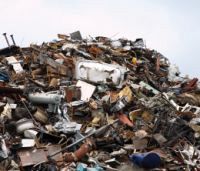

Greenpeace has published a report suggesting that over half of the household plastic waste sent for recycling is shipped abroad and most of it goes to countries with low recycling rates. Around 40% of that waste was sent to Turkey in 2020 - that's around 210,000 tonnes - where instead of being recycled or reused, some of it was burned and some was dumped in fields, by waterways and alongside roads.
The charity has been investigating 10 sites in Turkey and managed to find plastic bags and packaging from UK supermarkets at each one of them. In one instance, packaging for a coronavirus antigen test was found with an expiry date of August 2021 suggesting that the illegal and environmentally-damaging waste deposits were recent.
According to Nihan Temiz Atlas, biodiversity projects lead for Greenpeace Mediterranean, "Around 241 truckloads of plastic waste come to Turkey every day from across Europe and it overwhelms us. As far as we can see from the data and the field, we continue to be Europe's largest plastic waste dump."
The Department for Environment, Food and Rural Affairs (Defra) responded, stating "We are clear that the UK should handle more of its waste at home, and that's why we are committed to banning the export of plastic waste to non-OECD countries and clamping down on illegal waste exports - including to countries such as Turkey - through tougher controls.
The UK is a global leader in tackling plastic pollution and our proposals for extended producer responsibility for packaging, a plastic packaging tax and mandatory electronic waste tracking will boost recycling rates, reduce waste and cut crime."
The issue isn't necessarily with the disposal or production rates of recyclable plastics - it is more of an issue with the overproduction of plastic materials in the first place. Whilst the UK has taken steps to reduce or ban the use of single-use plastics such as carrier bags, plastic straws and cotton buds, it is felt more needs to be done, which is why an extended producer responsibility scheme is proposed in the Environment Bill.